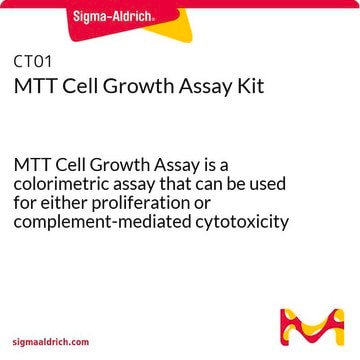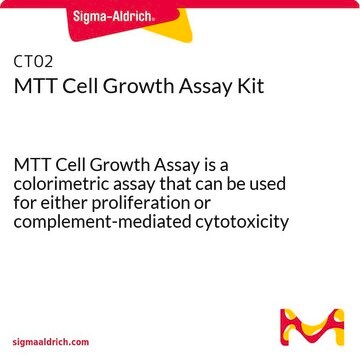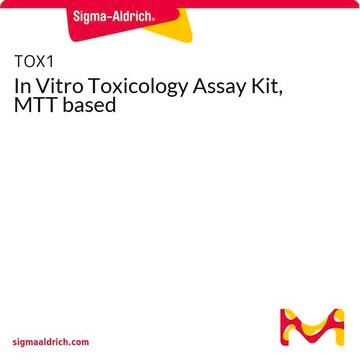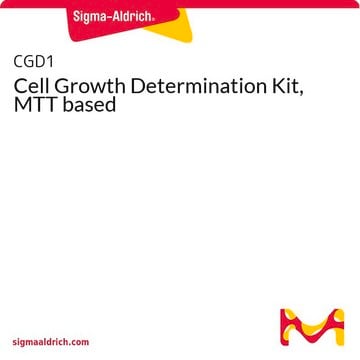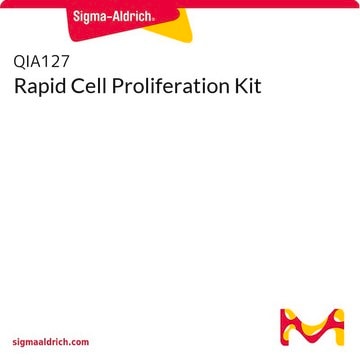11465007001
Roche
Cell Proliferation Kit I (MTT)
Synonym(s):
mtt
About This Item
Recommended Products
form
liquid
Quality Level
usage
sufficient for ≤2,500 tests
packaging
pkg of 1 kit
manufacturer/tradename
Roche
storage condition
protect from light
technique(s)
tissue culture: suitable
λmax
550-600 nm
application(s)
cell analysis
detection
detection method
colorimetric
storage temp.
−20°C
General description
Colorimetric assays analyze the number of viable cells by the cleavage of tetrazolium salts added to the culture medium. This technique requires neither washing nor harvesting of cells, and the complete assay, from microculture to data analysis by an ELISA reader, is performed in the same microplate.
MTT was the first tetrazolium salt described. It is cleaved to formazan by enzymes of the endoplasmic reticulum. This bioreduction occurs in viable cells only, and is related to NAD(P)H production through glycolysis. Therefore, the amount of formazan dye formed directly correlates to the number of metabolically active cells in the culture.
Colorimetric assay (MTT based) for the nonradioactive quantification of cellular proliferation, viability, and cytotoxicity.
Application
- Measurement of cell proliferation in response to growth factors, cytokines, mitogens, and nutrients
- Analysis of cytotoxic and cytostatic compounds, such as anti-cancer drugs and other pharmaceutical compounds
- Assessment of growth-inhibitory antibodies and physiological mediators
- Testing of biocompatibility of various scaffolds, employed in bone tissue engineering, for bone cell growth
Features and Benefits
- Safe and easy: Eliminate radioactive isotopes, washing steps, and additional reagents.
- Accurate: The absorbance obtained strongly correlates to the cell number.
- Sensitive: Detect low cell numbers.
- Fast: Process a large number of samples using a multi-well ELISA reader.
Cell proliferation and viability assays are of particular importance for routine applications in cell biology. Tetrazolium salts (e.g., MTT, XTT, WST-1) are particularly useful for this type of analysis. Tetrazolium salts are cleaved to formazan by the succinate-tetrazolium reductase system (EC 1.3.99.1) which belongs to the respiratory chain of the mitochondria, and is only active in metabolically intact cells (see below).
Packaging
Preparation Note
After thawing, the MTT labeling reagents may be stored protected from light at 2 to 8 °C for up to 4 weeks, in which case reagent filtration through a 0.2 μm pore size membrane is recommended.
Kit Components Only
- MTT Labeling Reagent
- Solubilization Solution
related product
Storage Class Code
12 - Non Combustible Liquids
WGK
WGK 2
Flash Point(F)
does not flash
Flash Point(C)
does not flash
Certificates of Analysis (COA)
Search for Certificates of Analysis (COA) by entering the products Lot/Batch Number. Lot and Batch Numbers can be found on a product’s label following the words ‘Lot’ or ‘Batch’.
Already Own This Product?
Find documentation for the products that you have recently purchased in the Document Library.
Customers Also Viewed
Articles
Cell based assays for cell proliferation (BrdU, MTT, WST1), cell viability and cytotoxicity experiments for applications in cancer, neuroscience and stem cell research.
Cell based assays for cell proliferation (BrdU, MTT, WST1), cell viability and cytotoxicity experiments for applications in cancer, neuroscience and stem cell research.
Cell based assays for cell proliferation (BrdU, MTT, WST1), cell viability and cytotoxicity experiments for applications in cancer, neuroscience and stem cell research.
Cell based assays for cell proliferation (BrdU, MTT, WST1), cell viability and cytotoxicity experiments for applications in cancer, neuroscience and stem cell research.
Protocols
MTT assay protocol for measuring cell viability, proliferation and cytotoxicity. Instructions for MTT reagent preparation and examples of applications.
MTT assay protocol for measuring cell viability, proliferation and cytotoxicity. Instructions for MTT reagent preparation and examples of applications.
MTT assay protocol for measuring cell viability, proliferation and cytotoxicity. Instructions for MTT reagent preparation and examples of applications.
MTT assay protocol for measuring cell viability, proliferation and cytotoxicity. Instructions for MTT reagent preparation and examples of applications.
Our team of scientists has experience in all areas of research including Life Science, Material Science, Chemical Synthesis, Chromatography, Analytical and many others.
Contact Technical Service

